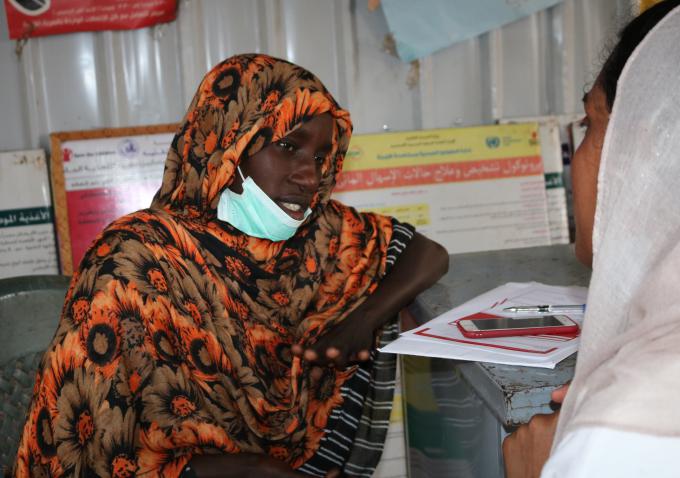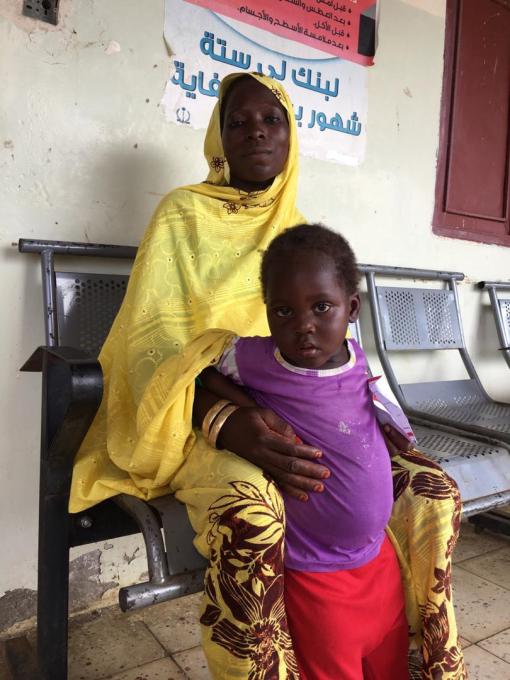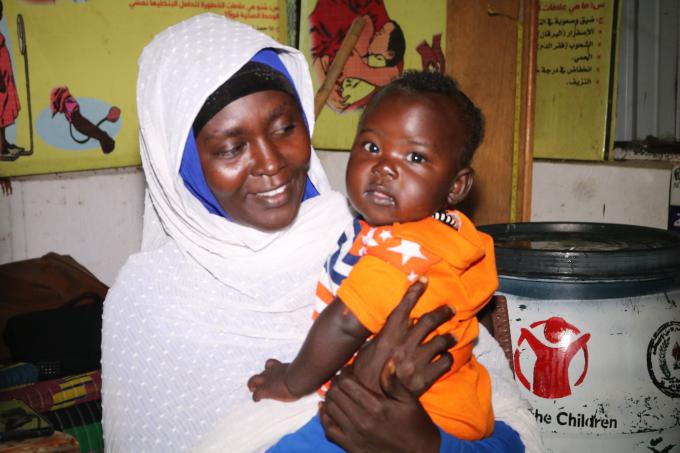Save the Children provides Health and Nutrition services to the most vulnerable communities in the Blue Nile State
Through the Integrated Health and Nutrition interventions for affected populations in Blue Nile State, Save the Children has developed 32 Mothers to Mothers Groups in 8 sites (4 groups per site) in Kurmuk, Gissan, and Altadamon localities in Blue Nile State, targeting 3200 mothers.
Our team has trained 32 mothers, to develop the groups. The groups aimed to increase community awareness and solve issues related to the nutrition and health of mothers and children with a focus on IYCF. Also, these groups worked to empower women to improve their skills in raising and discussing their problems.
The main objective of this project is to reduce excess mortality among children under five resulting from acute malnutrition. The nutrition project aimed to increase access to life-saving treatment services for acutely malnourished children under five years, pregnant and lactating mothers while protecting, promoting, and supporting appropriate IYCF practices that optimize nutrition and health survival outcomes in emergencies. The treatment of malnourished people (children, pregnant and lactating mothers) and malnutrition prevention interventions have been implemented through an integrated CMAM, and IYCF approaches.

Pic: Thuraya during the interview at Adasi-B Health Unit in the BN.
Thuraya Suliman (23 years old)- is a mother of two, Mazin (4 years old) and Muzan (2 years old). She lives one kilometer away from Adasi-B health unit in the Blue Nile. Thuraya has joined the Mothers to Mothers Groups developed by SCI 6 months ago. She has been trained by SCI staff to support additional ten mothers and raise awareness on issues related to nutrition and health of mothers and children. She says:
“My life is no longer the same, as before I joined the family support groups developed by Save the Children, I had minimum knowledge on nutrition. There was no one to consult and refer to when any issue about my health and my children’s arises.
I am grateful that this health unit exists because- firstly, through it, I have known a lot of information that enhanced the wellbeing of my children, the mothers that I support, and myself.
Secondly, because it provides health support and nutritious meals to children in need in my community.
In gratitude to all that, she adds, now I'm advising and following up with ten mothers in my area and providing them with the information I have received. I am proud of the role I play in my community and thankful for the role that the organization plays.”
Pic: Ikhlas with her child, during the interview at Adasi-A Health Unit in the BN.
Ikhlas Awad (32 years old), a mother of Eisa (6 months old boy), has been working as a midwife at the Adassi (A) health center for three years. She lives in adasi A village, 2 km from the center, where she provides counseling and advice to pregnant mothers and follow-up their condition during pregnancy and after 40 days after delivery. Moreover, she follows up on the condition of infants to provide them with appropriate support through vaccination and nutrition. She says:
“Despite the COVID19 pandemic, the number of registered mothers -especially pregnant women- who follow up on their condition has increased significantly during this year. At the health unit, we practice health precautions of physical distancing and alternative mask-wearing using available fabrics.
There has been a marked decrease in the mortality rate of pregnant mothers and new-borns, as I didn't register any cases during this year until October 15th.
Through conducting awareness sessions on Wednesdays, I urge women in general and pregnant and lactating mothers, in particular, to follow up on their condition at the early stage of their pregnancy.
Through the support of Save the Children, we have been able to provide clean delivery kits to pregnant women to aid them during the delivery at home. The kits include soaps, a plastic mat, cotton, and towels. I follow-up with the mother on the delivery day, then I visit her three days later, after a week, and after three weeks. I followed up with seven mothers who gave birth to four baby girls and three baby boys this month (October 2020).”
“There is still much to be done in order to increase the number of registered mothers at the center by intensifying the awareness and follow-up sessions and improving the support provided. We hope that the center includes laboratory examinations to provide better service to the community, especially mothers.” She added.

Pic: Khadija with her child, during the interview at the Health Center of the Area 9.
Khadija, 35 years old, is seven months pregnant and a mother of eight children, the youngest (Alzeena) is three years old. She lives about a kilometre from the health center in area 9 in AlDamazin in the Blue Nile State. She came few months ago to follow up on her second month's pregnancy. She says:
“I did not follow up during my pregnancy with my eight children. My neighbor encouraged me to come here. I have visited the center for the first time during my second month of pregnancy. I came to know useful information about the importance of nutrition and follow-up during during pregnancy, things I had never cared about before. I feel comfortable now with the health support I get at this center. I know I can come here in case of an emergency. I also bring my children to the center for check-ups and when they are sick.”
“I am grateful for the support provided by Save the Children as I have received a package of supplies that includes soap and a mosquito net to protect us from diseases like Malaria and Coronavirus. I will also get a clean delivery kit during my follow-up next month.” She added.
Save the Children (SCI), with the fund of Sudan Humanitarian Fund (SHF), is strictly contributing to reinforcing positive coping strategies & reduce vulnerabilities of targeted communities, and providing nutrition and health services while strengthening and build the capacity of local communities to enhance their self-reliance, water supply, sanitation & hygiene.
 Sudan
Sudan 